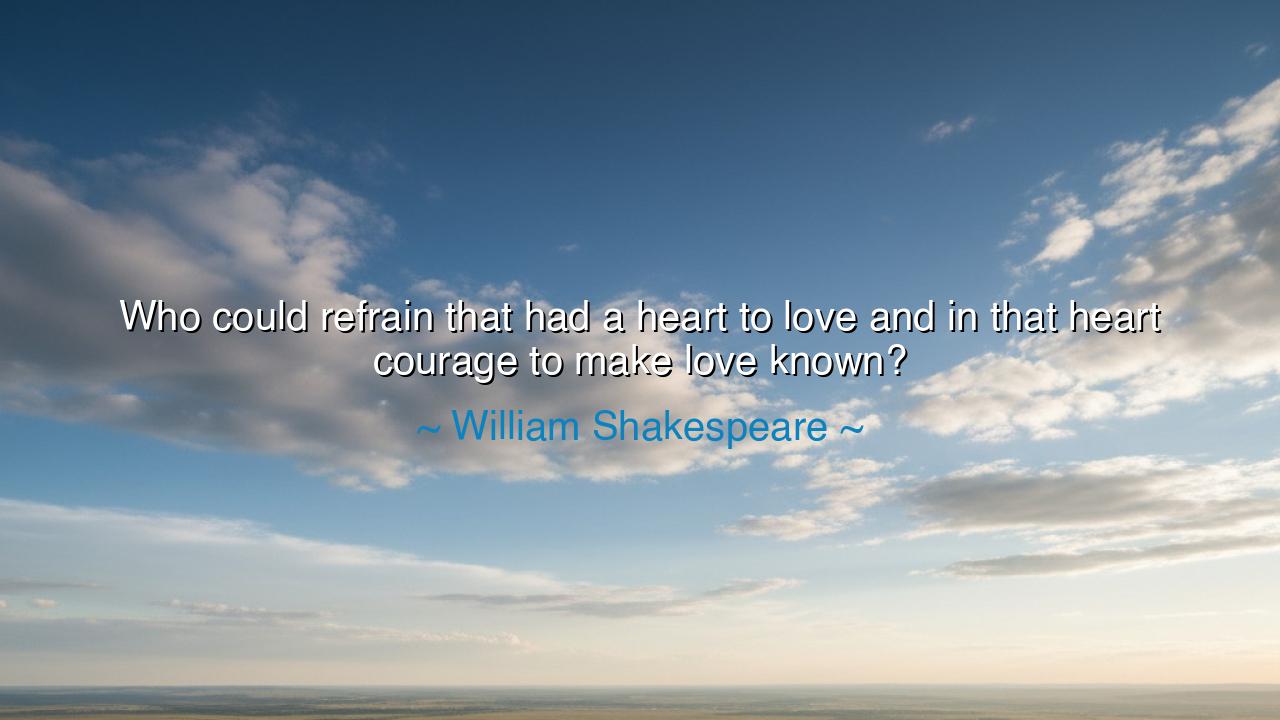
Who could refrain that had a heart to love and in that heart
Who could refrain that had a heart to love and in that heart courage to make love known?






In the immortal words of William Shakespeare, the master of human hearts, we are given a question that burns like an eternal flame: “Who could refrain that had a heart to love, and in that heart courage to make love known?” These words, drawn from his tragic play Macbeth, rise beyond the moment of drama into the realm of timeless truth. They speak to the divine bond between love and courage, reminding us that love, though tender, demands bravery; that the truest hearts are not those that feel deeply alone, but those that dare to reveal what they feel. For love unspoken is like a seed unplanted — full of potential, yet destined to wither in silence.
In this line, Shakespeare captures the essence of the human soul’s greatest conflict — the struggle between feeling and fear. To love is to expose oneself to vulnerability, to risk rejection, loss, or misunderstanding. Yet the poet asks, Who could refrain? Who, possessing both the fire of affection and the steel of courage, could resist expressing that which makes life meaningful? His question is not a challenge alone — it is a revelation: that love, when joined with courage, becomes irresistible. It is not merely emotion; it is movement, action, creation.
In the time of Shakespeare, love was often veiled in formality and guarded expression. Yet through his characters — from Romeo to Beatrice, from Viola to Rosalind — he tore away the masks and showed love as it truly is: a force both tender and fierce. When Macduff speaks these words in Macbeth, it is not romantic love he refers to, but the love of family, of justice, of honor. He has just learned that his wife and children have been slain, and though grief pierces him, he transforms that agony into purpose. His love compels him to act. Thus, Shakespeare shows us that love — whether of person, country, or truth — demands not merely passion, but courage.
Throughout history, we find countless souls who could not “refrain” once love and courage filled their hearts. Consider Mahatma Gandhi, whose love for his people and his homeland burned brighter than his fear of empire. His courage to “make love known” took the form of peace, nonviolence, and sacrifice. He did not speak of love as sentiment, but as power — a power that dismantled tyranny and awakened the conscience of the world. His life was a living echo of Shakespeare’s question, for he could not refrain; his love compelled him to reveal itself through action.
So too with Mother Teresa, who saw the divine in every face of suffering. Her love was not confined to words or ideals, but manifested in hands that healed and hearts that comforted. When asked why she chose a life of poverty and service, she replied simply, “I am in love with God’s people.” Her courage was not the roar of battle, but the quiet, relentless strength to love those the world had abandoned. She, too, had a heart to love, and in that heart, the courage to make that love known through deeds of mercy.
Shakespeare’s wisdom reminds us that love is not for the faint of heart. To love truly — whether a person, a calling, or an ideal — is to stand naked before the world, open and unguarded. Many speak of love, but few possess the courage to live it. Fear builds walls around the heart; courage tears them down. The one who dares to love, and to make that love known, changes the world around them — for love declared is love multiplied, and love acted upon is love eternal.
Thus, let this teaching be a lamp for all who hear it: if you have a heart to love, do not hide it behind silence or shame. Speak it, show it, live it. Tell those you cherish that they matter. Stand for what you believe, even when the world mocks or misunderstands. Be brave in your tenderness, fierce in your compassion, unyielding in your truth. The heart that loves without courage is like a bird that never flies; but the heart that dares to make its love known — that heart touches heaven itself.
And so, as Shakespeare’s question still rings across the centuries — “Who could refrain?” — let the answer be: Not I. Not those who live with purpose, nor those who dream with faith, nor those who carry within them the sacred fire of love. For love demands courage, and courage fulfills love. Together they form the greatest virtue of all — the force by which humanity endures, redeems, and ascends.






AAdministratorAdministrator
Welcome, honored guests. Please leave a comment, we will respond soon